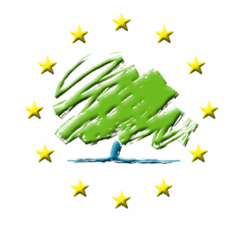Conservative Europe Group
| Conservative Group for Europe | |
|---|---|
 | |
| President | Kenneth Clarke |
| Chairperson | Neil Carmichael |
| Founded | 1969 |
| European affiliation | Conservative MEPs and friends in the EPP |
| Website | |
| Website | |
The Conservative Group for Europe (CGE) exists to promote Britain's vigorous and purposeful membership of the European Union, advancing national interests through influence, collaboration and compromise by engaging in the shared challenges all European countries face. The organisation supports a Europe built on Conservative principles of an open market, individual and business opportunity and a responsible engagement in world affairs. CEG asserts that if a Conservative government is to have any chance of effectively tackling trans-national challenges including climate change, energy supplies, transport infrastructure, population shifts, common borders and free movement within, trans-border crime, terrorism, economic and financial turbulence, open markets and competition policy and security, then open, flexible working alliances with mainstream European colleagues are the only solution.
Originally named the European Forum (1967–69), from 1969 until 2009 it was known as the Conservative Group for Europe before changing its name to reflect the evolution of its remit.[1] It was felt that emphasis should be on Conservatives active within Europe rather than merely 'for' Europe.
The Rt. Hon. Neil Carmichael MP is the current Chairman, and The Rt. Hon. Kenneth Clarke MP is the President.
History
Founded to promote the UK's entry to the European Economic Community (now the European Union), CEG was launched in May 1967 as the European Forum, with David Baker as the founding chairman. With the resignation from the French presidency of Charles De Gaulle, who had been the major opponent of UK entry into the European Community, the European Forum was supported by Conservative MPs who favoured British membership. As negotiations with the EC got fully under way, the Forum changed its name to the more self-explanatory title of the Conservative Group for Europe (CGE).
CGE provided the infrastructure for the operation run by Norman St John-Stevas MP to muster support among Conservative MPs, resulting eventually in the United Kingdom's entry to the European Community on 1 January 1973.[2] CGE was very active in the 1975 European Referendum campaign, and many MPs were members. An early Chairman was Sir James Spicer, former MP and MEP.
In the 1980/90s its annual conference at Brandon Hall near Coventry attracted leading figures from the Conservative Party, MPs and MEPs and leaders from countries with which the Conservative Party was affiliated in the European Peoples Party.
Current role
CGE changed its name in 2007 to Conservative Europe Group (CEG) better to reflect its role as the officially recognised organisation within the Conservative Party committed to a positive and constructive approach to Britain's essential role in the European Union. CGE/CEG is part of Conservative Mainstream, along with the Tory Reform Group.
CGE/CEG has worked closely with and as part of the European Movement in the UK for decades. It is also now allied with the efforts of British Influence. It continues to have a significant fringe meeting at the Conservative Party Conference, often in conjunction with like minded organisations such as the European Union of Women and Business for New Europe.
Former Chairmen of CGE/CEG include former MP Ian Taylor (1985–88 and 2007–11) who also chaired the European Movement 2000–2004 and Robert Walter MP.
Others closely associated with the Group include the late Sir Edward Heath, Kenneth Clarke MP, John Gummer (Lord Deben), Lord Brittan, Tom Spencer (former MEP), Sir Tony Baldry MP, David Curry (former MP) and Malcolm Harbour MEP. Past and current officers and Patrons are on the official website. Andy Simpson, former MEP and chairman of the Progressive European Network, is Treasurer of the CEG.
CEG has a youth wing, Young Conservative Europe Group, Alexander O'Brien, who is a member of both the European Democrat Students, and the Nordic Conservative Student Union.[3][4][5]